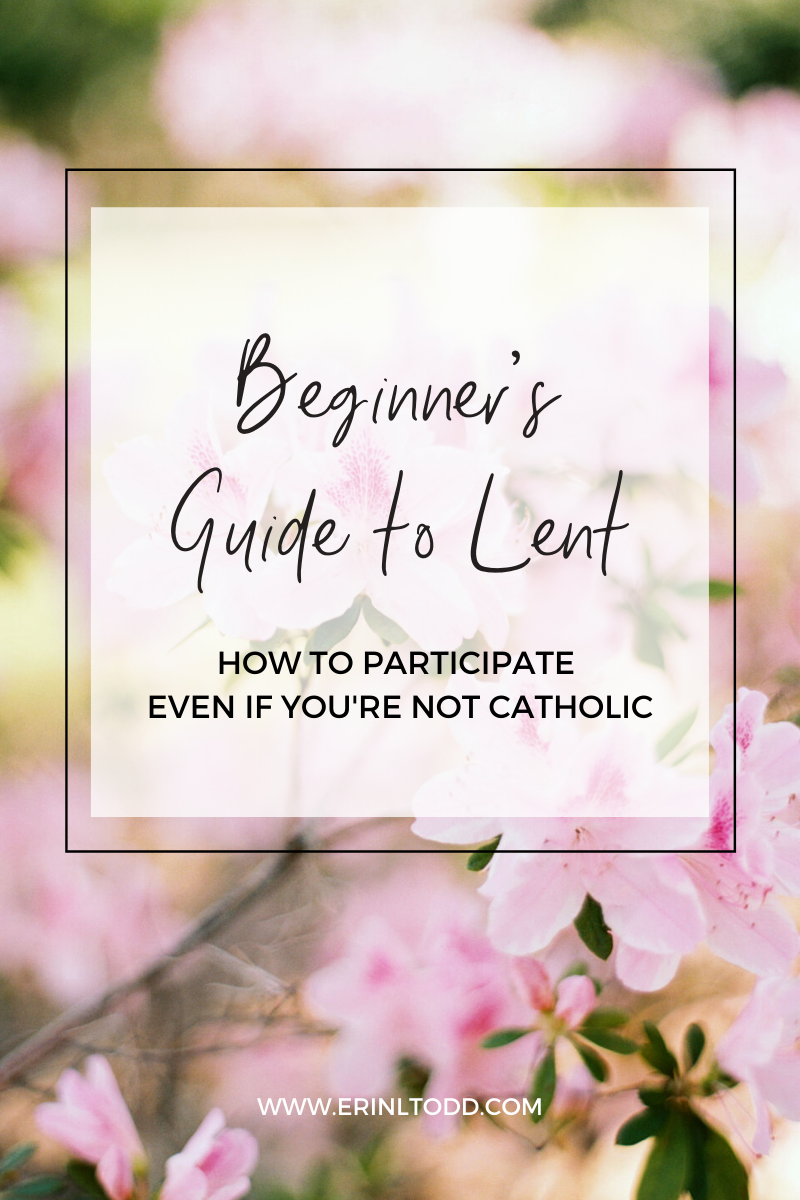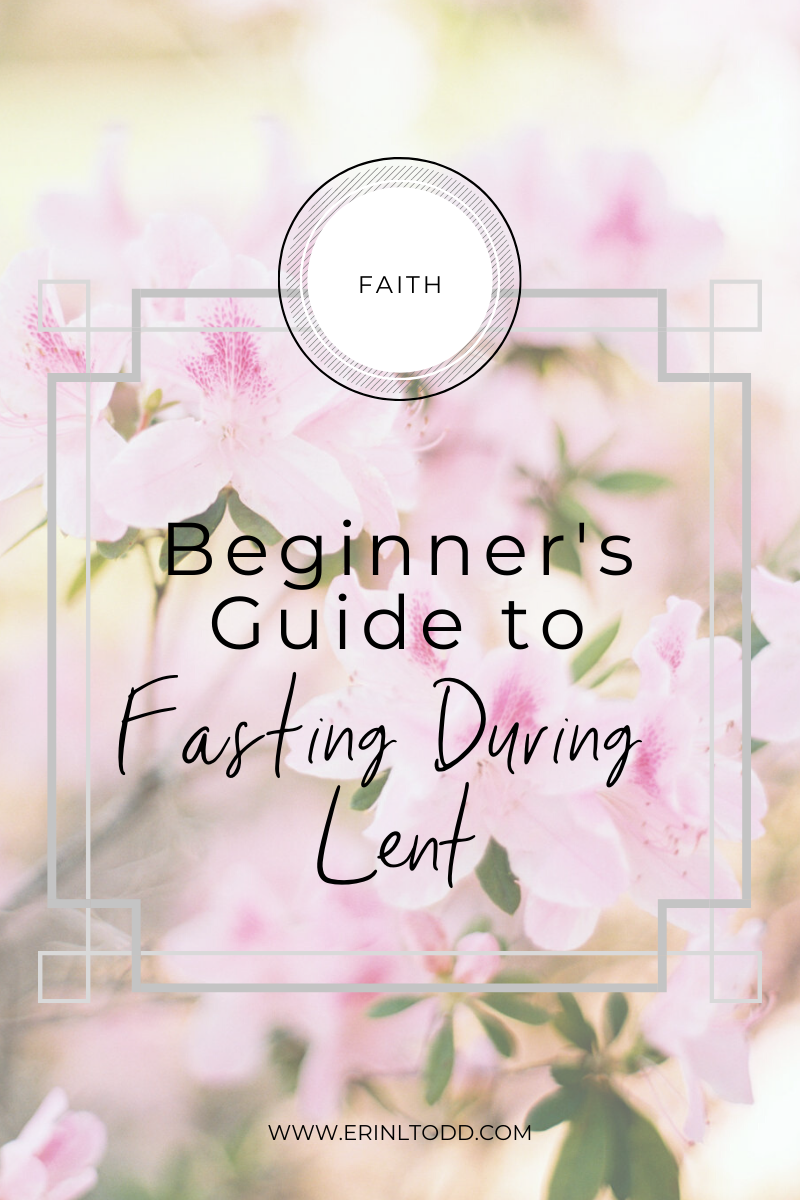Beginner’s Guide to Lent
In this Beginner’s Guide to Lent I will address common questions and provide a basic overview of the Lenten season.
What is Lent all about? What do I need to know about Lent? As a Christian but not a Catholic, what do I need to know about Lent? How can I observe Lent if I’m not a Catholic? Is Lent only for Catholics? Should I give up something for Lent? What should I give up for Lent? What is the point of all this?!
Friend, I asked every single one of these questions myself two years ago as I was going through the R.C.I.A. program (a church program for adults to become Catholic) at my local parish. I was totally oblivious to the whole thing having not grown up in church and coming from a southern baptist background.
It felt overwhelming at first, since I am such a type A rule follower. There seemed to be so many rules with Lent!
But I’m also a huge fan of learning. So I really enjoyed diving head first into learning about the history of Lent, the meaning behind it, and the disciplines that I could practice myself to take part in it. I collected brochures, handouts and took notes from my R.C.I.A. class trying to soak up as much as I could.
From what I’ve learned in my R.C.I.A. class, I’ve compiled this Beginner’s Guide to Lent.
This is not an exhaustive or comprehensive teaching, but a basic overview. Essentially, it is a compilation of what stood out to me the most and what answered all those initial questions I had in the beginning.

Beginner’s Guide to Lent
Think of this as Lent 101 taught by a baby Catholic.
It is my hope that this will inspire you to find a facet of Lent that speaks to you that you can incorporate into your own walk with the Lord. (Catholic or not!).
It is my hope that you will learn something new. (You probably won’t if you’re Catholic, LOL!)
But above all, it is deepest hope that this will remind you why this season is kind of a big deal and help you prepare your heart for Easter.
What do I need to know about Lent?
Lent in a nutshell:
- A 40 day “penitential period” leading up to Easter
- The season of Lent begins on Ash Wednesday and continues until Holy Thursday
- 3 spiritual practices (aka disciplines) of Lent: prayer, fasting and almsgiving
What is the point of Lent?
- Recalling Jesus’ 40 day fast in the wilderness, the participation in the spiritual practices of Lent is a form of purification that deepens our connection to and reliance on the Lord
- The Lenten journey of sacrifice unites us with the sacrifice of Jesus
- Lent is a time of spiritual renewal
- “Nothing brings us closer to Christ than walking alongside him and doing the things he did for the love of God the Father. During Lent, God invites us to purify our hearts and minds and to turn our intentions back to him.” – Regnum Christi Daily Meditation 2/26/20 The Joy of Lent
Why do Catholics have ashes on their foreheads on Ash Wednesday?
- Catholics begin the season of Lent on Ash Wednesday where they receive ashes on their foreheads to remind them of their mortality and call to repentance.
- Ashes are from burning the palms from last year’s Palm Sunday service
- When receiving the ashes, the priest makes the Sign of the Cross on each person’s forehead and says either:
- Remember that you are dust and to dust you will return -OR-
- Turn away from sin and be faithful to the Gospel
- Learn more here
- Check out my first Ash Wednesday here: https://erinltodd.com/giving-up-diet-culture-for-lent/
A Beginner’s Guide to Prayer During Lent
- “Prayer is something that is available to everyone. It involves a journey into our inner space where we find that darkness is required to see the light of Christ.” – R.C.I.A. handout
- “Prayer purifies our intentions and relates all we do to God.” – Regnum Christi Daily Meditation 2/26/20 The Joy of Lent
- Lent is a good time to develop or deepen our prayer life!
- Ways to start a daily prayer routine:
- I began my own personal daily prayer routine by selecting a few very specific times of day and devoting them to a brief moment with the Lord:
- (1) first thing in the morning before my feet hit the floor I pray my daily surrender prayer and set my intention for the day;
- (2) before meals I pray a prayer of thanksgiving;
- (3) once my head hits the pillow but before I get too sleepy, I say my nightly prayers.
- Using guided prayers when I have no words or don’t know what to pray
- Journaling my prayers in an actual notebook for 5 minutes a day – writing them by hand is somehow so powerful!
- Reading a short devotion and using that as a springboard for sitting with the Lord for 5 more minutes in silence meditating on the word or in prayer.
- I began my own personal daily prayer routine by selecting a few very specific times of day and devoting them to a brief moment with the Lord:
- Ways to strengthen a daily prayer routine:
- Try new types of prayer (I want to learn to pray the rosary)
- More frequent prayer breaks in your day (try setting a timer on your phone to remind you)
- Longer, more dedicated time to prayer (such as a retreat)
- Prayer circles or small group prayers – harness the power of community!
- Step up your praying for others game – go ask a friend how you can be praying for them and start!

A Beginner’s Guide to Fasting During Lent
- Fasting is a way to focus your mind and heart on the Lord by ridding yourself of distractions that interfere with your relationship with the Lord.
- Think of it as spring cleaning to experience God more fully at Easter!
- Fasting, beyond just exercising self control, can be a form of spiritual and physical purification.
- “Fasting increases the attentive power of the self and leads the body to draw energy from the Spirit.” – R.C.I.A. Handout
- “Fasting detaches us from our comfort and from ourselves.” – Regnum Christi Daily Meditation 2/26/20 The Joy of Lent
- “The discipline of fasting helps us recognize our true hunger – for Christ – and seek a closer relationship to him to satisfy that hunger.” – Lent pamphlet by Our Sunday Visitor
- The Catholic Church has specific guidelines for fasting and abstinence (which you should consult if you are Catholic and intend to observe Lent).
- Check out some of my first impressions of fasting during my first Lent: https://erinltodd.com/fasting-from-diet-culture/
Do I have to give up something for Lent?
- No, but you might want to! See the Fasting During Lent section to see why.
- Giving up something for Lent is a great way to keep your priorities straight and see what it feels like to actually LIVE those priorities for a bit.
- When we remove the unnecessary things in life by fasting from them, we are able to more easily focus on what is necessary in life (our relationship with God) and re-connect with what is truly important.
- What should I give up for Lent?
- Short answer: that is between you and God. You should pray through that question and where the Lord leads you.
- Check out this separate post for inspiration on different things you might want to give up for Lent (COMING SOON)
A Beginner’s Guide to Almsgiving During Lent
- The Lenten season is a time to help those in need by doing acts of charity.
- “Almsgiving reflects our brotherhood with the poor of Jesus’ family and reminds us that our true wealth is not in things, but in the love of God.” – Regnum Christi Daily Meditation 2/26/20 The Joy of Lent
- Christians are called year-round to help the poor and the needy, so Lent is a good time to check in with yourself and see if you are answering this call and what you can do to improve the way you serve others.
- Almsgiving is not just for donations of material goods and wealth (though those are certainly vital). We are called to love our neighbors as ourselves, which includes giving of ourselves, our gifts, our time.
- Pray to heighten your awareness of those in need and to see those around you through Jesus’ eyes. You might find a need right in front of you that you never saw before!
Easter and Lent
- The end of the penitential season of Lent is the most sacred time of the Church year: Holy Thursday, Good Friday and Holy Saturday.
- After participating in Christ’s sacrifice through our Lenten practices, we more fully experience His resurrection on Easter!
- Here are a few of my fav Good Friday resources
How will you prepare your heart for Easter?
I hope this has been helpful in explaining what Lent is all about.
But more than that, I hope it has inspired you to take something away from this Beginner’s Guide to Lent and put it into practice in your own life in the next few weeks, regardless of your denomination.
How will you be deepening or developing your prayer life to prepare for Easter?
Will you be fasting from something to prepare for Easter?
How will you love and serve others well during the next 40 days?
